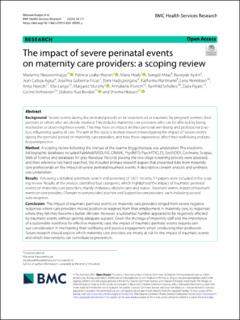| dc.contributor.author | Nieuwenhuijze, Marianne | |
| dc.contributor.author | Leahy‑Warren, Patricia | |
| dc.contributor.author | Healy, Maria | |
| dc.contributor.author | Aktaş, Songül | |
| dc.contributor.author | Aydin, Ruveyde | |
| dc.contributor.author | Calleja‑Agius, Jean | |
| dc.contributor.author | Goberna‑Tricas, Josefna | |
| dc.contributor.author | Hadjigeorgiou, Eleni | |
| dc.contributor.author | Hartmann, Katharina | |
| dc.contributor.author | Henriksen, Lena | |
| dc.contributor.author | Horsch, Antje | |
| dc.contributor.author | Lange, Ute | |
| dc.contributor.author | Murphy, Margaret | |
| dc.contributor.author | Pierron, Annabelle | |
| dc.contributor.author | Schäfers, Rainhild | |
| dc.contributor.author | Pajalic, Zada | |
| dc.contributor.author | Verhoeven, Corine | |
| dc.contributor.author | Ruiz Berdun, Dolores | |
| dc.contributor.author | Hossain, Sheima | |
| dc.date.accessioned | 2024-02-15T09:16:30Z | |
| dc.date.available | 2024-02-15T09:16:30Z | |
| dc.date.created | 2024-02-14T14:22:29Z | |
| dc.date.issued | 2024 | |
| dc.identifier.citation | BMC Health Services Research. 2024, 24 , Article number: 171, 1-11 | en_US |
| dc.identifier.issn | 1472-6963 | |
| dc.identifier.uri | https://hdl.handle.net/11250/3117908 | |
| dc.description | This article is licensed under a Creative Commons Attribution 4.0 International License, which permits use, sharing, adaptation, distribution and reproduction in any medium or format, as long as you give appropriate credit to the original author(s) and the source, provide a link to the Creative Commons licence, and indicate if changes were made. The images or other third party material in this article are included in the article’s Creative Commons licence, unless indicated otherwise in a credit line to the material. If material is not included in the article’s Creative Commons licence and your intended use is not permitted by statutory regulation or exceeds the permitted use, you will need to obtain permission directly from the copyright holder. To view a copy of this licence, visit http://creativecommons.org/licenses/by/4.0/. The Creative Commons Public Domain Dedication waiver (http://creativecom mons.org/publicdomain/zero/1.0/) applies to the data made available in this article, unless otherwise stated in a credit line to the data. | en_US |
| dc.description.abstract | Background: Severe events during the perinatal period can be experienced as traumatic by pregnant women, their partners or others who are closely involved. This includes maternity care providers who can be affected by being involved in or observing these events. This may have an impact on their personal well-being and professional practice, influencing quality of care. The aim of this study is to map research investigating the impact of severe events during the perinatal period on maternity care providers, and how these experiences affect their well-being and professional practice.
Method: A scoping review following the manual of the Joanna Briggs Institute was undertaken. The electronic bibliographic databases included PubMed/MEDLINE, CINAHL, PsycINFO, PsycARTICLES, SocINDEX, Cochrane, Scopus, Web of Science and databases for grey literature. Records passing the two-stage screening process were assessed, and their reference lists hand searched. We included primary research papers that presented data from maternity care professionals on the impact of severe perinatal traumatic events. A descriptive content analysis and synthesis was undertaken.
Results: Following a detailed systematic search and screening of 1,611 records, 57 papers were included in the scoping review. Results of the analysis identified four categories, which highlighted the impact of traumatic perinatal events on maternity care providers, mainly midwives, obstetricians and nurses: Traumatic events, Impact of traumatic events on care providers, Changes in care providers’ practice and Support for care providers; each including several subcategories.
Conclusion: The impact of traumatic perinatal events on maternity care providers ranged from severe negative responses where care providers moved position or resigned from their employment in maternity care, to responses where they felt they became a better clinician. However, a substantial number appeared to be negatively affected by traumatic events without getting adequate support. Given the shortage of maternity staff and the importance of a sustainable workforce for effective maternity care, the impact of traumatic perinatal events requires serious consideration in maintaining their wellbeing and positive engagement when conducting their profession. Future research should explore which maternity care providers are mostly at risk for the impact of traumatic events and which interventions can contribute to prevention. | en_US |
| dc.language.iso | eng | en_US |
| dc.publisher | BioMed Central (BMC) | en_US |
| dc.rights | Navngivelse 4.0 Internasjonal | * |
| dc.rights.uri | http://creativecommons.org/licenses/by/4.0/deed.no | * |
| dc.subject | trauma | en_US |
| dc.subject | support | en_US |
| dc.subject | impact | en_US |
| dc.subject | perinatal period | en_US |
| dc.subject | adverse event | en_US |
| dc.subject | severe event | en_US |
| dc.subject | nurses | en_US |
| dc.subject | obstetricians | en_US |
| dc.subject | midwives | en_US |
| dc.subject | care providers | en_US |
| dc.subject | maternity care | en_US |
| dc.title | The impact of severe perinatal events on maternity care providers: a scoping review | en_US |
| dc.type | Peer reviewed | en_US |
| dc.type | Journal article | en_US |
| dc.description.version | publishedVersion | en_US |
| dc.rights.holder | © The Author(s) 2024 | en_US |
| dc.source.pagenumber | 1-11 | en_US |
| dc.source.volume | 24 | en_US |
| dc.source.journal | BMC Health Services Research | en_US |
| dc.identifier.doi | https://doi.org/10.1186/s12913-024-10595-y | |
| dc.identifier.cristin | 2245997 | |
| dc.source.articlenumber | 171 | en_US |
| cristin.ispublished | true | |
| cristin.fulltext | original | |
| cristin.qualitycode | 2 | |

